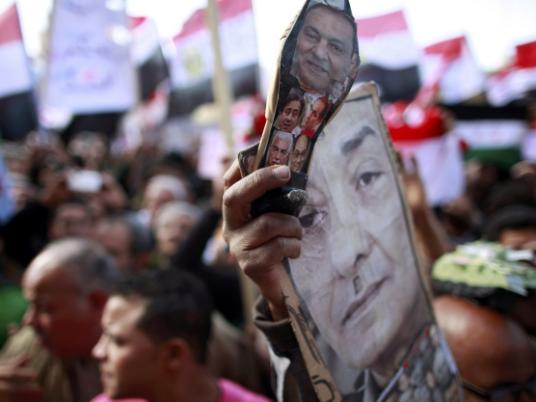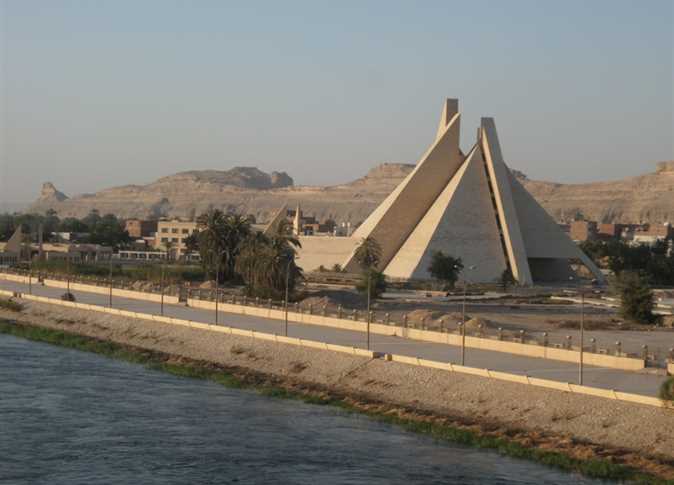
Around 40,000 demonstrators congregated in Tahrir Square Friday evening, after 14 marches from neighborhoods around Cairo arrived in the symbolic home of the 25 January revolution to protest against continued military rule.
The protesters chanted against the ruling Supreme Council of the Armed Forces, accusing the council of responsibility for killing more than 80 civilians since former President Hosni Mubarak stepped down last February.
Demonstrators held up a doll of SCAF leader Field Marshal Hussein Tantawi in the square. The protesters manipulated the doll to have the fake Tantawi say, "We [the SCAF] have protected the revolution. Whoever is in Tahrir is a thug."
Earlier in the evening, the Muslim Brotherhood stage in Tahrir Square attempted to drown out anti-Brotherhood protesters by turning up Quranic verses on its loudspeakers.
The dispute began when some protesters marched into the square, raised their shoes at the Brotherhood's stage, chanted and threw rocks at them. After turning up the Quranic verses failed, Brotherhood members instead began chanting against the SCAF.
That did not work, either, so the Brotherhood invited some revolutionary youths onto their stage to convince the crowd to not attack them. After that failed, the Brotherhood announced that it would remove an anniversary banner from its stage as an affront to the revolutionaries, and draped a cloth over the banner.
Earlier in the square, a group of judges held a mock trial for former President Hosni Mubarak, former First Lady Suzanne Mubarak, and other symbols of the deposed Mubarak regime, charging them with corrupting Egyptian politics, abusing power and squandering public funds.
The judges mock sentenced all of the defendants to death. They were then expected to march to the Supreme Constitutional Court to demand their rulings be implemented.
Al-Azhar announced earlier in the day that it will soon issue a 150-member statement demanding the ruling military council "immediately" hand over power to a civilian presidential council, as massive protests take place across Egypt demanding an end to military rule.
Scholars from the preeminent Sunni institution have constructed a nine-point statement to help solve Egypt's current political crisis, said Sheikh Gamil Allam, a former dean of Al-Azhar's Faculty of Islamic Law.
The statement will urge the SCAF to transfer power to a council headed by respected civilian figures, including Hamdeen Sabbahi, Noha al-Zeiny, Abdel Moneim Abouel Fotouh, Hossam Eissa, George Ishaq, Ahmed Harara and Ghada Kamal, as well as a member from the SCAF.
The SCAF should also begin accepting presidential nominations, and prepare to draft the new constitution and hold a referendum on its legitimacy within 60 days, Allam added.
Allam said that the Al-Azhar statement will also address the ongoing trial of former President Hosni Mubarak and other figures from his regime, retribution and compensation for the families of the revolution's martyrs, and the release of all political prisoners and those sentenced in military courts.
The statement will also set a time frame for meeting the demands from different segments of society, which include respecting press freedoms as well as NGOs and human rights organizations.
Thousands flooded into Tahrir Square throughout the day on Friday, chanting "Down with military rule. We the people are the red line" and "The people want the fall of the regime" after Friday prayers in a protest they have named both the "Friday of Pride and Dignity" and the "Second Friday of Anger."
Massive marches named after martyrs of the 25 January revolution headed toward Tahrir from various Cairo neighborhoods on Friday afternoon, chanting similar slogans. Similar protests are also taking place in various governorates around the country.
After Friday prayers concluded at Istiqama mosque in Giza, thousands of worshipers held a march named after Alaa Abdel Hady, a doctoral student who was killed in December clashes outside the cabinet building between protesters and security and military forces.
In the upper-class neighborhood of Heliopolis, around 100 people marched, chanting "Down with military rule" and inviting residents to join them.
Witnesses said that protesters began to gather outside Nour mosque in Abbasseya in preparation for another march to Tahrir named after Mohamed Mohsen, who was killed in clashes in Abbasseya in July of last year.
Protesters chanted slogans against the SCAF, such as "Why are we governed by the military? Is Hosni coming back?" and "Bread, freedom, human dignity."
In the Giza neighborhood of Mohandiseen, demonstrators set off in a march named after Al-Azhar scholar Emad Effat, who was also killed during the December clashes outside the cabinet.
In addition, a march from Khazendara mosque in Shubra headed to Tahrir named for Sally Zahran, who was killed in the early days of the 18-day uprising against Mubarak.
Earlier in the square, the preacher of Omar Makram mosque delivered the Friday sermon to thousands of Egyptians who gathered there to protest military rule and demand a swift transfer of power to a civilian government.
"Have we toppled the regime or are there some former figures still manipulating the fate of the nation?" said Sheikh Mazhar Shaheen, who often preaches at Friday protests in the square. "The revolution has not fulfilled all of its goals."
Shaheen then chanted, "God protect the revolution" and the protesters shouted "God is great" in response.
Before Shaheen began his sermon, thousands filled Tahrir to take part in the mass demonstration.
Popular committees, mostly comprised of Muslim Brotherhood members and other volunteers, closed off all the entrances to Tahrir to inspect those arriving.
Three stages have been set up in the square for the April 6 Youth Movement, Muslim Brotherhood, 25 January Revolution Youth Coalition, and a fourth for independent political forces.
"I announce today I did not come here in celebration, I came to call for fair retribution for those who killed our martyrs," Shaheen continued in his sermon. "We will not celebrate while our martyrs' blood has not yet dried."
The protesters are denouncing the slow pace of trials for those implicated in killing protesters during the 25 January revolution and demanding that the SCAF swiftly hand over power to civilians.
On Wednesday, hundreds of thousands of Egyptians flooded Tahrir Square and other public areas nationwide to protest and celebrate the first anniversary of the uprising that toppled former President Hosni Mubarak. The Friday morning demonstrators joined dozens who have been staging a sit-in in Tahrir since Wednesday.
Revolutionary groups have recently proposed that the SCAF transfer power to the newly elected speaker of the People's Assembly, Saad al-Katatny of the Muslim Brotherhood's Freedom and Justice Party, until a new president is elected.
The People's Assembly is currently the only elected authority in Egypt. Prior to the revolution, Mubarak's now-disbanded National Democratic Party had a commanding majority in the legislature.







